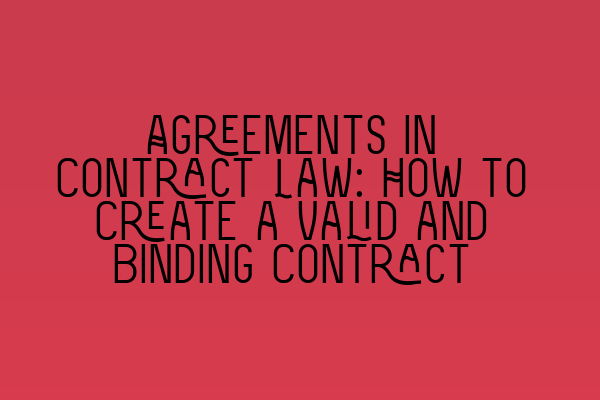In contract law, agreements play a crucial role in creating legally binding contracts. Understanding how to form a valid contract is essential for both solicitors and individuals entering into agreements. In this article, we will explore the key elements required to create a valid and binding contract.
The Offer and Acceptance
A contract begins with an offer made by one party to another. The offer must be clear, definite, and communicated to the other party. It should include the terms and conditions of the proposed agreement. Once the offer is made, the other party can accept it to create a binding contract. The acceptance must be unambiguous and communicated to the offeror.
It is important to note that an invitation to treat, such as a display of goods in a shop, is not the same as an offer. It is an invitation for the customer to make an offer to purchase, which can then be accepted or rejected by the seller.
Consideration
Consideration is the value exchanged between the parties to a contract. It can be in the form of money, goods, services, or a promise to do or refrain from doing something. For a contract to be valid, each party must provide consideration. It is a key element that distinguishes a contract from a gratuitous promise.
Consideration can be something of value given at the time of the agreement or something promised to be given in the future. However, it is important to remember that consideration must be legally sufficient and cannot be illusory.
Intention to Create Legal Relations
In order for a contract to be valid, there must be an intention by the parties to create legal relations. This means that the parties must intend for their agreement to be legally binding. In most commercial transactions, this intention is presumed. However, in certain domestic and social arrangements, there may be a presumption against legal intent.
It is worth noting that agreements made in the course of commercial negotiations are generally presumed to have an intention to create legal relations, even if a formal contract is not yet executed.
Capacity and Legality
For a contract to be binding, the parties must have the capacity to enter into the agreement. This means that they must be of sound mind, of legal age, and not under any legal disability that would prevent them from understanding the nature and consequences of the contract.
Moreover, the subject matter of the contract must be legal. It cannot involve illegal activities or go against public policy. If a contract is found to be illegal or against public policy, it will be considered void and unenforceable.
Conclusion
Understanding the requirements for creating a valid and binding contract is essential in contract law. The offer and acceptance, consideration, intention to create legal relations, capacity, and legality are the key elements that must be satisfied. Failure to meet any of these elements may result in an unenforceable or void contract.
If you are preparing for the SQE contract law exam, we recommend checking out our related articles on SQE 1 Practice Exam Questions, SQE 1 Practice Mocks FLK1 FLK2, SQE 2 Preparation Courses, and SQE 1 Preparation Courses. These resources can help you prepare for the exam and enhance your understanding of contract law.
Stay informed about the latest SRA SQE exam dates by visiting our article on SRA SQE Exam Dates.
